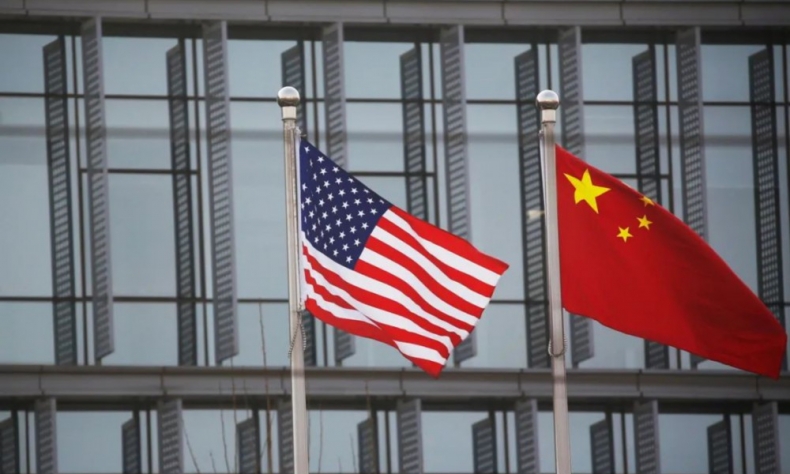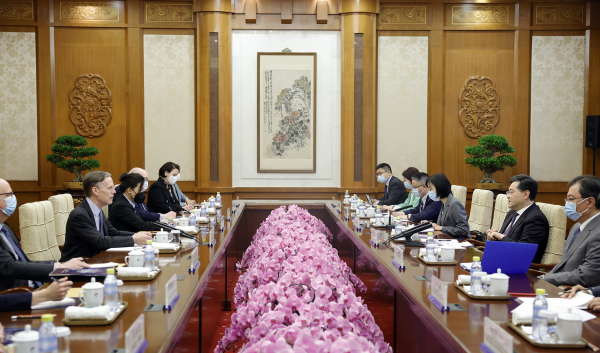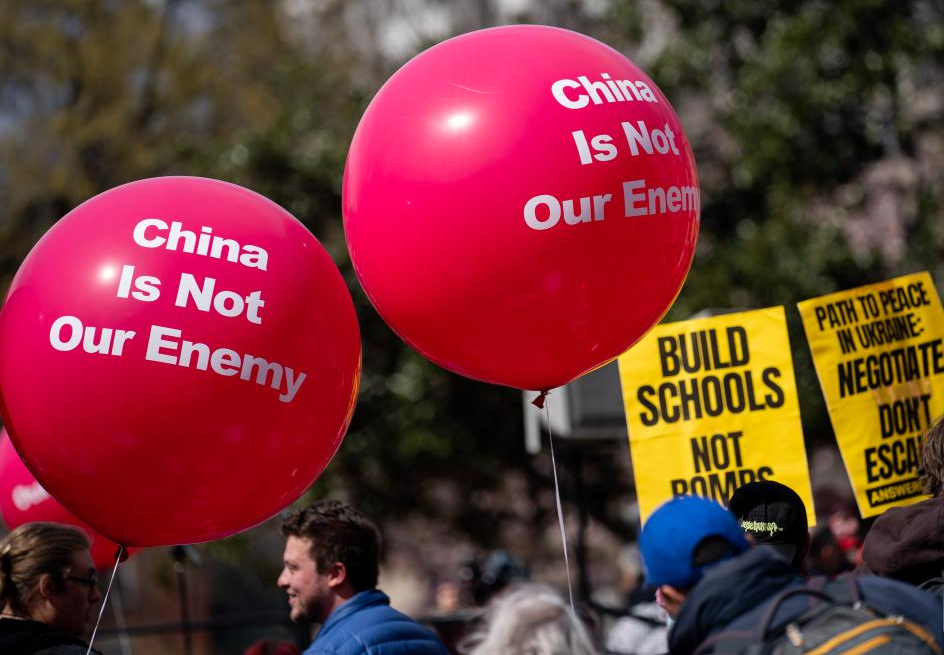China-U.S. Stalemate Shows Signs of Easing

Dialogue cannot be used to justify actions that harm China’s interests and the U.S. must demonstrate its commitment to improving bilateral relations through tangible actions.
China and the United States are engaging in more high-level talks. Wang Yi, Director of the Office of the Foreign Affairs Commission of the Communist Party of China (CPC) Central Committee, and U.S. National Security Advisor Jake Sullivan had candid, in-depth, substantive and constructive discussions on bilateral ties in Vienna, Austria, on May 10-11.
Wang, also a member of the Political Bureau of the CPC Central Committee, and Sullivan held discussions on removing obstacles in the Sino-American relationship and keeping bilateral ties from deteriorating.
Earlier, Chinese State Councilor and Foreign Minister Qin Gang met with U.S. Ambassador to China Nicholas Burns in Beijing on May 8. It was the first time Burns had met China’s top diplomat since he took office in April 2022.
China-U.S. relations are of great significance not only to the two countries but to the world, Qin, who succeeded the posts previously held by Wang in March, told Burns. President Xi Jinping and U.S. President Joe Biden reached an important consensus during their meeting in Bali, Indonesia, last November [ahead of the Group of 20 Summit there]. “However, a series of erroneous words and deeds from the American side since has undermined the hard-won positive momentum in the Sino-American relationship, disrupted the planned dialogue and cooperation agenda and chilled bilateral relations again,” he said.
The top priority is to stabilize China-U.S. relations, avoid a downward spiral and prevent misunderstandings between China and the U.S., according to Qin. He stressed this should be the basic consensus between the two countries, adding the U.S. should work with China to get the ties back on track.
Good timing
On May 8, Burns tweeted that he and Qin had “discussed challenges in the U.S.-China relationship and the necessity of stabilizing ties and expanding high-level communication.”
The meeting happened after Burns on May 2 had said “the U.S. is ready to talk” as he virtually joined an event organized by the Stimson Center, a think tank in Washington, D.C., according to NBC News.
“The U.S. relationship with China remains complicated and competitive, but Washington does not seek conflict with Beijing and believes more dialogue would be constructive,” the ambassador added.

Chinese Foreign Ministry spokesperson Wang Wenbin said on May 8 that the Qin-Burns meeting was a normal diplomatic arrangement as he answered a question about the timing and signals of this encounter.
“The meeting is a positive sign. I believe Burns had been waiting for this conversation and it finally happened, indicating the stalemate between China and the U.S. is beginning to dissolve,” Wu Xinbo, Dean of the Institute of International Studies and Director at the Center for American Studies at Fudan University in Shanghai, told Beijing Review. “But it’s just a beginning.”
China halted cooperation with the U.S. on security, climate change and other areas as countermeasures following the visit to China’s Taiwan region by then Speaker of the U.S. House of Representatives Nancy Pelosi last August, which constituted a serious violation of the one-China principle and infringed upon China’s sovereignty and territorial integrity. Despite China later resuming talks, the U.S. hyping up the “wandering balloon” incident led to new tensions. In late January, a Chinese balloon was spotted over North American airspace. The U.S. claimed it was a “spy balloon” and shot it down on February 4, collecting the debris, while China reiterated it was a meteorological balloon and the unintentional entry into American airspace was due to force majeure. The worsening situation resulted in the U.S. postponement of Secretary of State Antony Blinken’s trip to China scheduled for early February.
“Qin’s meeting with Burns shows that the level of diplomatic contact has been raised; it also implies that a meeting between the foreign ministers of the two countries may be on the agenda,” Lu Xiang, a research fellow with the Chinese Academy of Social Sciences, told Chinese newspaper Global Times on May 8.
In recent weeks, senior U.S. officials have hinted at a re-engagement with China, calling for healthy and constructive relations. Blinken told The Washington Post on May 3 that it’s important to re-establish regular lines of communication at all levels and across the government. U.S. climate envoy John Kerry said the same day that China had invited him to visit the country in the near term for talks on averting a global climate change crisis, Reuters News Agency reported.
Burns has undertaken recent travels to Guangzhou, capital of Guangdong Province, Shanghai and Tianjin to engage in direct dialogue with individuals from a range of sectors, including government officials and representatives from esteemed universities.

Action speaks louder
In his meeting with Burns, Qin further stated “The U.S. should not talk about communication while continuously trying to suppress and contain China.”
He emphasized the U.S. must respect China’s red lines and stop damaging China’s sovereignty, security and development interests. In particular, the U.S. must “correctly handle the Taiwan question, stop hollowing out the one-China principle and stop supporting and conniving at ‘Taiwan independence’ separatist forces.”
“Qin’s message was clear: China is open to engaging in dialogue to resolve differences, but any dialogue must have a clear purpose and not merely be for the sake of talking. Dialogue cannot be used to justify actions that harm China’s interests and the U.S. must demonstrate its commitment to improving bilateral relations through tangible actions,” Lu said.
The U.S. officially rejects “Taiwan independence” but at the same time sends military contractors to the region; this is inconsistent, according to the research fellow.
A delegation of U.S. defense contractors attended a “defense industry forum” in Taipei on May 3. Head of the delegation, retired Lieutenant General Steven Rudder, who once oversaw U.S. Marine Corps operations in the Pacific, said in his speech that U.S. defense contractors “want to be part of the self-defense capabilities of Taiwan.”
Two days later Reuters reported the Biden administration planned to send $500 million worth of “weapons aid” to Taiwan using the same emergency authority that has been used more than 35 times for Ukraine.
Wu pointed out although the Biden administration has exhibited a willingness to talk and work with China, its strategy inherited from former President Donald Trump still considers China a major competitor instead of both a rival and partner. “That’s the root cause of the worsening China-U.S. relations,” he explained.

“To ameliorate bilateral relations, the U.S. must change how it perceives China on a handful of issues, including the Taiwan question and technological blockade,” Wu said. “America’s current China policy, which claims rivalry, competition and cooperation coexist, is self-confrontational because there’s no clear line between the three. You cannot request cooperation when you contain China in the name of competition, and you cannot avoid conflict when you cross China’s red lines. That’s wishful thinking on the part of the U.S.”
University Distinguished Service Professor, Emeritus and former Dean of Harvard’s Kennedy School of Government Joseph Nye also raised his concerns over the conditions of China-U.S. relations. “I’m afraid that, as I said, it’s a cooperative rivalry, but there’s too much emphasis on the rivalry and not enough on the cooperation,” he said at a book launch hosted by the Center for China and Globalization in Beijing on April 28.
Nye’s new book, Soft Power and Great-Power Competition: Shifting Sands in the Balance of Power Between the United States and China, is published by Springer Nature and CITIC Press, a publishing company based in Beijing.
He believes no country could pose an existential threat to the other unless the two blunder into a protracted conflict, similar to the situation in Europe in 1914 when great powers thought they could have a short, sharp war but ended up with a four-year war that killed over 10 million people and destroyed four empires.
“To get this [Sino-American] cooperation going, we’ll have more meetings like the one Xi and Biden had in Bali, but it’s going to have to become a more regular thing, not just the occasional event,” he added.
 Facebook
Facebook
 Twitter
Twitter
 Linkedin
Linkedin
 Google +
Google +










